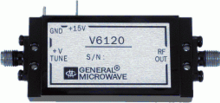
Back Oscil·lador controlat per tensió Catalan Napětím řízený oscilátor Czech Spændingsstyret oscillator Danish Spannungsgesteuerter Oszillator German Oscilador controlado por tensión Spanish Pingega tüüritav ostsillaator Estonian نوسانساز کنترلشده با ولتاژ Persian VCO Finnish Oscillateur commandé en tension French מתנד מבוקר מתח HE

A voltage-controlled oscillator (VCO) is an electronic oscillator whose oscillation frequency is controlled by a voltage input. The applied input voltage determines the instantaneous oscillation frequency. Consequently, a VCO can be used for frequency modulation (FM) or phase modulation (PM) by applying a modulating signal to the control input. A VCO is also an integral part of a phase-locked loop. VCOs are used in synthesizers to generate a waveform whose pitch can be adjusted by a voltage determined by a musical keyboard or other input.
A voltage-to-frequency converter (VFC) is a special type of VCO designed to be very linear in frequency control over a wide range of input control voltages.[1][2][3]
- ^ Godse, Atul P.; Bakshi, U. A. (2009). Linear Integrated Circuits And Applications. Technical Publications. p. 497. ISBN 978-8189411305.
- ^ Drosg, Manfred; Steurer, Michael Morten (2014). Dealing with Electronics. Walter de Gruyter GmbH. pp. 4.5.3. ISBN 978-3110385625.
- ^ Salivahanan, S. (2008). Linear Integrated Circuits. Tata McGraw-Hill Education. p. 515. ISBN 978-0070648180.
© MMXXIII Rich X Search. We shall prevail. All rights reserved. Rich X Search